
KG-LLM-Papers
[Paper List] Papers integrating knowledge graphs (KGs) and large language models (LLMs)
Stars: 1750
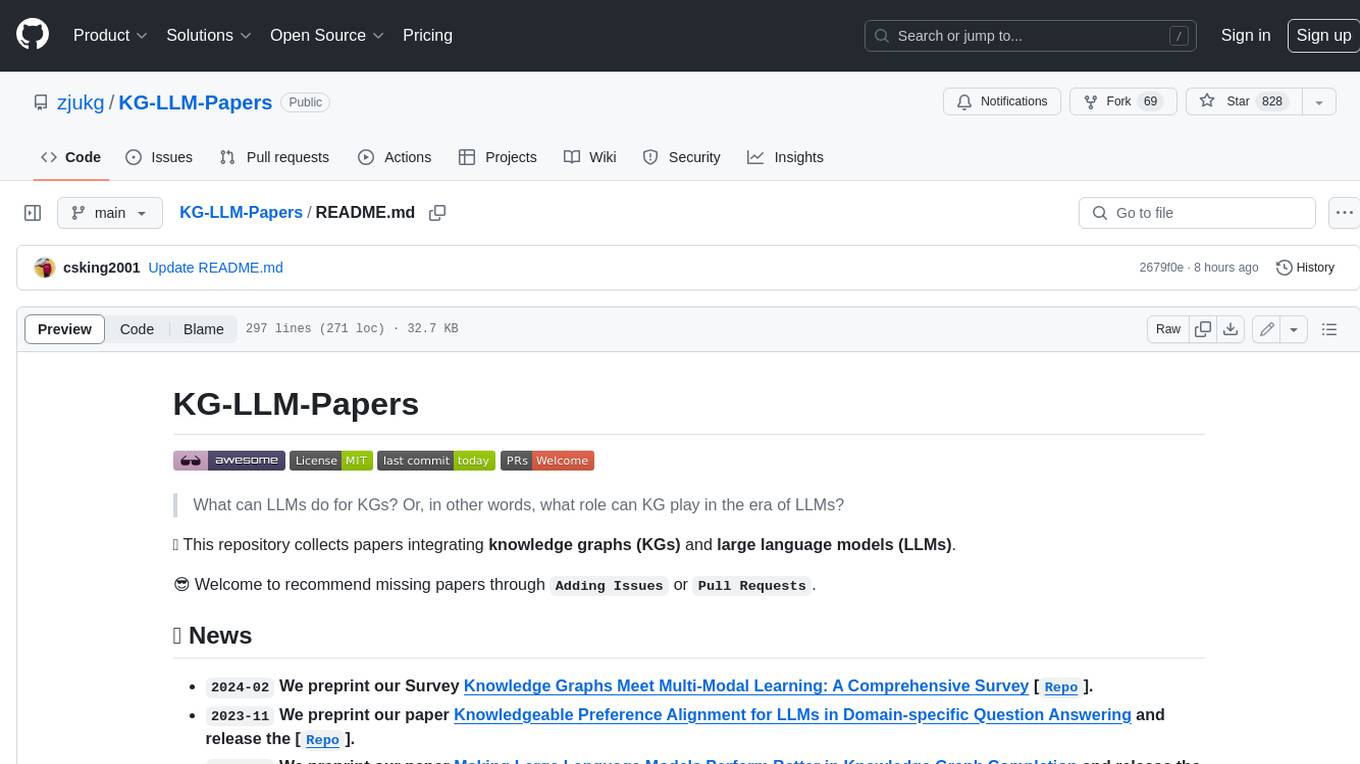
KG-LLM-Papers is a repository that collects papers integrating knowledge graphs (KGs) and large language models (LLMs). It serves as a comprehensive resource for research on the role of KGs in the era of LLMs, covering surveys, methods, and resources related to this integration.
README:
What can LLMs do for KGs? Or, in other words, what role can KG play in the era of LLMs?
🙌 This repository collects papers integrating knowledge graphs (KGs) and large language models (LLMs).
😎 Welcome to recommend missing papers through Pull Requests.
2025-01We preprint our Paper Have We Designed Generalizable Structural Knowledge Promptings? Systematic Evaluation and Rethinking [Repo].2024-09Our paper MKGL: Mastery of a Three-Word Language has been accepted by NeurIPS 2024 as a spotlight paper. [Repo]2024-07Our paper Making Large Language Models Perform Better in Knowledge Graph Completion has been accepted by ACM MM 2024 as an oral paper. [Repo]2024-05Our paper Knowledgeable Preference Alignment for LLMs in Domain-specific Question Answering has been accepted by ACL 2024. [Repo]2024-02We preprint our Survey Knowledge Graphs Meet Multi-Modal Learning: A Comprehensive Survey [Repo].2023-06We create this repository to maintain a paper list onIntergrating Knowledge Graphs and Large Language Models.
- [arxiv] Knowledge Graphs Meet Multi-Modal Learning: A Comprehensive Survey.
2024.02 - [arxiv] Can Knowledge Graphs Reduce Hallucinations in LLMs? : A Survey.
2023.11 - [arxiv] Survey on Factuality in Large Language Models: Knowledge, Retrieval and Domain-Specificity.
2023.10 - [arxiv] On the Evolution of Knowledge Graphs: A Survey and Perspective.
2023.10 - [arxiv] Benchmarking the Abilities of Large Language Models for RDF Knowledge Graph Creation and Comprehension: How Well Do LLMs Speak Turtle?
2023.09 - [arxiv] Explainability for Large Language Models: A Survey.
2023.09 - [arxiv] Generations of Knowledge Graphs: The Crazy Ideas and the Business Impact.
2023.08 - [arxiv] Large Language Models and Knowledge Graphs: Opportunities and Challenges.
2023.08 - [TKDE] Unifying Large Language Models and Knowledge Graphs: A Roadmap.
2023.06[Repo] - [arxiv] ChatGPT is not Enough: Enhancing Large Language Models with Knowledge Graphs for Fact-aware Language Modeling.
2023.06 - [arxiv] A Survey of Knowledge-Enhanced Pre-trained Language Models.
2023.05
- [arxiv] OntoTune: Ontology-Driven Self-training for Aligning Large Language Models.
2025.2 - [EMNLP 2024 findings] Question-guided Knowledge Graph Re-scoring and Injection for Knowledge Graph Question Answering.
2024.11 - [EMNLP 2024 findings] SPINACH: SPARQL-Based Information Navigation for Challenging Real-World Questions.
2024.11 - [arxiv] Decoding on Graphs: Faithful and Sound Reasoning on Knowledge Graphs through Generation of Well-Formed Chains.
2024.10 - [arxiv] Towards Graph Foundation Models: The Perspective of Zero-shot Reasoning on Knowledge Graphs.
2024.10 - [NeurIPS 2024] MKGL: Mastery of a Three-Word Language.
2024.10[Repo] - [NeurIPS 2024] UrbanKGent: A Unified Large Language Model Agent Framework for Urban Knowledge Graph Construction.
2024.10[Repo] - [NeurIPS 2024] KG-FIT: Knowledge Graph Fine-Tuning Upon Open-World Knowledge.
2024.10[Repo] - [ICML 2024] Coarse-to-Fine Highlighting: Reducing Knowledge Hallucination in Large Language Models.
2024.10[Repo] - [ACL 2024] SAC-KG: Exploiting Large Language Models as Skilled Automatic Constructors for Domain Knowledge Graphs.
2024.09 - [NeurIPS 2024] LLM4EA: Entity Alignment with Noisy Annotations from Large Language Models.
2024.09[Repo] - [arxiv] Chain-of-Knowledge: Integrating Knowledge Reasoning into Large Language Models by Learning from Knowledge Graphs.
2024.07 - [arxiv] GraphEval: A Knowledge-Graph Based LLM Hallucination Evaluation Framework.
2024.07 - [arxiv] Think-on-Graph 2.0: Deep and Interpretable Large Language Model Reasoning with Knowledge Graph-guided Retrieval.
2024.07 - [ISWC 2024] Finetuning Generative Large Language Models with Discrimination Instructions for Knowledge Graph Completion.
2024.07 - [ACL 2024 findings] Two-stage Generative Question Answering on Temporal Knowledge Graph Using Large Language Models.
2024.07 - [arxiv] Tree-of-Traversals: A Zero-Shot Reasoning Algorithm for Augmenting Black-box Language Models with Knowledge Graphs.
2024.07 - [NAACL 2024 findings] GenTKG: Generative Forecasting on Temporal Knowledge Graph with Large Language Models.
2024.06 - [ACL 2024 findings] Two-stage Generative Question Answering on Temporal Knowledge Graph Using Large Language Models.
2024.06 - [arxiv] Efficient Knowledge Infusion via KG-LLM Alignment.
2024.06 - [arxiv] Knowledge Graph Enhanced Retrieval-Augmented Generation for Failure Mode and Effects Analysis.
2024.06 - [arxiv] Knowledge Graph-Enhanced Large Language Models via Path Selection.
2024.06 - [arxiv] Learning to Plan for Retrieval-Augmented Large Language Models from Knowledge Graphs.
2024.06 - [arxiv] Docs2KG: Unified Knowledge Graph Construction from Heterogeneous Documents Assisted by Large Language Models.
2024.06 - [arxiv] UniOQA: A Unified Framework for Knowledge Graph Question Answering with Large Language Model.
2024.06 - [arxiv] Multimodal Reasoning with Multimodal Knowledge Graph.
2024.06 - [arxiv] Knowledge Graph in Astronomical Research with Large Language Models: Quantifying Driving Forces in Interdisciplinary Scientific Discovery.
2024.06 - [arxiv] EffiQA: Efficient Question-Answering with Strategic Multi-Model Collaboration on Knowledge Graphs.
2024.06 - [arxiv] Explore then Determine: A GNN-LLM Synergy Framework for Reasoning over Knowledge Graph.
2024.06 - [arxiv] EMERGE: Integrating RAG for Improved Multimodal EHR Predictive Modeling.
2024.06 - [EPJ Data Science] Glitter or Gold? Deriving Structured Insights from Sustainability Reports via Large Language Models.
2024.06 - [arxiv] DepsRAG: Towards Managing Software Dependencies using Large Language Models.
2024.06[Repo] - [arxiv] KNOW: A Real-World Ontology for Knowledge Capture with Large Language Models
2024.05[Repo] - [arxiv] HippoRAG: Neurobiologically Inspired Long-Term Memory for Large Language Models
2024.05[Repo] - [arxiv] Prompt-Time Ontology-Driven Symbolic Knowledge Capture with Large Language Models
2024.05[Repo] - [arxiv] Timeline-based Sentence Decomposition with In-Context Learning for Temporal Fact Extraction.
2024.05 - [arxiv] SOK-Bench: A Situated Video Reasoning Benchmark with Aligned Open-World Knowledge.
2024.05 - [arxiv] Mitigating Hallucinations in Large Language Models via Self-Refinement-Enhanced Knowledge Retrieval.
2024.05 - [arxiv] Prompting Large Language Models with Knowledge Graphs for Question Answering Involving Long-tail Facts.
2024.05 - [arxiv] DALK: Dynamic Co-Augmentation of LLMs and KG to answer Alzheimer's Disease Questions with Scientific Literature.
2024.05 - [arxiv] BiasKG: Adversarial Knowledge Graphs to Induce Bias in Large Language Models.
2024.05 - [arxiv] AttacKG+:Boosting Attack Knowledge Graph Construction with Large Language Models.
2024.05 - [arxiv] Sora Detector: A Unified Hallucination Detection for Large Text-to-Video Models.
2024.05 - [arxiv] FOKE: A Personalized and Explainable Education Framework Integrating Foundation Models, Knowledge Graphs, and Prompt Engineering.
2024.05 - [arxiv] Relations Prediction for Knowledge Graph Completion using Large Language Models.
2024.05 - [arxiv] Evaluating Large Language Models for Structured Science Summarization in the Open Research Knowledge Graph.
2024.05 - [arxiv] Improving Complex Reasoning over Knowledge Graph with Logic-Aware Curriculum Tuning.
2024.05 - [arxiv] RAG-based Explainable Prediction of Road Users Behaviors for Automated Driving using Knowledge Graphs and Large Language Models.
2024.05 - [arxiv] PrivComp-KG : Leveraging Knowledge Graph and Large Language Models for Privacy Policy Compliance Verification.
2024.04 - [arxiv] Multi-hop Question Answering over Knowledge Graphs using Large Language Models.
2024.04 - [arxiv] Automated Construction of Theme-specific Knowledge Graphs.
2024.04 - [arxiv] Retrieval-Augmented Generation with Knowledge Graphs for Customer Service Question Answering.
2024.04 - [arxiv] Evaluating Class Membership Relations in Knowledge Graphs using Large Language Models.
2024.04 - [arxiv] KGValidator: A Framework for Automatic Validation of Knowledge Graph Construction.
2024.04 - [arxiv] Context-Enhanced Language Models for Generating Multi-Paper Citations.
2024.04 - [arxiv] Reasoning on Efficient Knowledge Paths:Knowledge Graph Guides Large Language Model for Domain Question Answering.
2024.04 - [arxiv] KG-CTG: Citation Generation through Knowledge Graph-guided Large Language Models.
2024.04 - [arxiv] CuriousLLM: Elevating Multi-Document QA with Reasoning-Infused Knowledge Graph Prompting.
2024.04 - [arxiv] ODA: Observation-Driven Agent for integrating LLMs and Knowledge Graphs.
2024.04 - [arxiv] Building A Knowledge Graph to Enrich ChatGPT Responses in Manufacturing Service Discovery.
2024.04 - [arxiv] Logic Query of Thoughts: Guiding Large Language Models to Answer Complex Logic Queries with Knowledge Graphs.
2024.04 - [arxiv] Extract, Define, Canonicalize: An LLM-based Framework for Knowledge Graph Construction.
2024.04 - [COLM 2024] Unveiling LLMs: The Evolution of Latent Representations in a Dynamic Knowledge Graph.
2024.04 - [arxiv] Construction of Functional Materials Knowledge Graph in Multidisciplinary Materials Science via Large Language Model.
2024.04 - [arxiv] On Linearizing Structured Data in Encoder-Decoder Language Models: Insights from Text-to-SQL.
2024.04 - [arxiv] Self-Improvement Programming for Temporal Knowledge Graph Question Answering.
2024.04 - [arxiv] A Preliminary Roadmap for LLMs as Assistants in Exploring, Analyzing, and Visualizing Knowledge Graphs.
2024.04 - [arxiv] Evaluating the Factuality of Large Language Models using Large-Scale Knowledge Graphs.
2024.04 - [arxiv] Harnessing the Power of Large Language Model for Uncertainty Aware Graph Processing.
2024.04 - [arxiv] EventGround: Narrative Reasoning by Grounding to Eventuality-centric Knowledge Graphs.
2024.04 - [arxiv] Generate-on-Graph: Treat LLM as both Agent and KG in Incomplete Knowledge Graph Question Answering.
2024.04 - [arxiv] From Local to Global: A Graph RAG Approach to Query-Focused Summarization.
2024.04 - [arxiv] HyKGE: A Hypothesis Knowledge Graph Enhanced Framework for Accurate and Reliable Medical LLMs Responses.
2024.04 - [arxiv] KnowLA: Enhancing Parameter-efficient Finetuning with Knowledgeable Adaptation.
2024.03 - [LREC-COLING 2024] KC-GenRe: A Knowledge-constrained Generative Re-ranking Method Based on Large Language Models for Knowledge Graph Completion.
2024.03 - [arxiv] K-Act2Emo: Korean Commonsense Knowledge Graph for Indirect Emotional Expression.
2024.03 - [arxiv] Fusing Domain-Specific Content from Large Language Models into Knowledge Graphs for Enhanced Zero Shot Object State Classification.
2024.03 - [arxiv] Construction of Hyper-Relational Knowledge Graphs Using Pre-Trained Large Language Models.
2024.03 - [arxiv] Call Me When Necessary: LLMs can Efficiently and Faithfully Reason over Structured Environments.
2024.03 - [arxiv] From human experts to machines: An LLM supported approach to ontology and knowledge graph construction.
2024.03 - [arxiv] Complex Reasoning over Logical Queries on Commonsense Knowledge Graphs.
2024.03 - [arxiv] Knowledge Graph Large Language Model (KG-LLM) for Link Prediction.
2024.03 - [arxiv] KG-Rank: Enhancing Large Language Models for Medical QA with Knowledge Graphs and Ranking Techniques.
2024.03 - [arxiv] Advancing Biomedical Text Mining with Community Challenges.
2024.03 - [arxiv] Knowledge Graphs as Context Sources for LLM-Based Explanations of Learning Recommendations.
2024.03 - [arxiv] Evidence-Focused Fact Summarization for Knowledge-Augmented Zero-Shot Question Answering.
2024.03 - [arxiv] AceMap: Knowledge Discovery through Academic Graph.
2024.03 - [arxiv] KnowPhish: Large Language Models Meet Multimodal Knowledge Graphs for Enhancing Reference-Based Phishing Detection.
2024.03 - [arxiv] Unveiling Hidden Links Between Unseen Security Entities.
2024.03 - [LREC-COLING 2024] Multi-perspective Improvement of Knowledge Graph Completion with Large Language Models.
2024.03 - [arxiv] Infusing Knowledge into Large Language Models with Contextual Prompts.
2024.03 - [arxiv] CR-LT-KGQA: A Knowledge Graph Question Answering Dataset Requiring Commonsense Reasoning and Long-Tail Knowledge.
2024.03 - [arxiv] Right for Right Reasons: Large Language Models for Verifiable Commonsense Knowledge Graph Question Answering.
2024.03 - [arxiv] Automatic Question-Answer Generation for Long-Tail Knowledge.
2024.03 - [arxiv] AutoRD: An Automatic and End-to-End System for Rare Disease Knowledge Graph Construction Based on Ontologies-enhanced Large Language Models.
2024.03 - [arxiv] Stepwise Self-Consistent Mathematical Reasoning with Large Language Models.
2024.02 - [arxiv] Two-stage Generative Question Answering on Temporal Knowledge Graph Using Large Language Models.
2024.02 - [arxiv] Unlocking the Power of Large Language Models for Entity Alignment.
2024.02 - [arxiv] Enhancing Temporal Knowledge Graph Forecasting with Large Language Models via Chain-of-History Reasoning.
2024.02 - [arxiv] Breaking the Barrier: Utilizing Large Language Models for Industrial Recommendation Systems through an Inferential Knowledge Graph.
2024.02 - [arxiv] Knowledge Graph Enhanced Large Language Model Editing.
2024.02 - [arxiv] Modality-Aware Integration with Large Language Models for Knowledge-based Visual Question Answering.
2024.02 - [arxiv] Graph-Based Retriever Captures the Long Tail of Biomedical Knowledge.
2024.02 - [arxiv] LLM as Prompter: Low-resource Inductive Reasoning on Arbitrary Knowledge Graphs.
2024.02 - [arxiv] Counter-intuitive: Large Language Models Can Better Understand Knowledge Graphs Than We Thought.
2024.02 - [arxiv] InfuserKI: Enhancing Large Language Models with Knowledge Graphs via Infuser-Guided Knowledge Integration.
2024.02 - [arxiv] Towards Development of Automated Knowledge Maps and Databases for Materials Engineering using Large Language Models.
2024.02 - [arxiv] KG-Agent: An Efficient Autonomous Agent Framework for Complex Reasoning over Knowledge Graph.
2024.02 - [arxiv] PAT-Questions: A Self-Updating Benchmark for Present-Anchored Temporal Question-Answering.
2024.02 - [arxiv] A Condensed Transition Graph Framework for Zero-shot Link Prediction with Large Language Models.
2024.02 - [arxiv] Enhancing Large Language Models with Pseudo- and Multisource- Knowledge Graphs for Open-ended Question Answering.
2024.02 - [arxiv] G-Retriever: Retrieval-Augmented Generation for Textual Graph Understanding and Question Answering.
2024.02 - [arxiv] X-LoRA: Mixture of Low-Rank Adapter Experts, a Flexible Framework for Large Language Models with Applications in Protein Mechanics and Design.
2024.02 - [arxiv] REALM: RAG-Driven Enhancement of Multimodal Electronic Health Records Analysis via Large Language Models.
2024.02 - [arxiv] GLaM: Fine-Tuning Large Language Models for Domain Knowledge Graph Alignment via Neighborhood Partitioning and Generative Subgraph Encoding.
2024.02 - [arxiv] Let Your Graph Do the Talking: Encoding Structured Data for LLMs.
2024.02 - [arxiv] CADReN: Contextual Anchor-Driven Relational Network for Controllable Cross-Graphs Node Importance Estimation.
2024.02 - [arxiv] An Enhanced Prompt-Based LLM Reasoning Scheme via Knowledge Graph-Integrated Collaboration.
2024.02 - [arxiv] SPARQL Generation: an analysis on fine-tuning OpenLLaMA for Question Answering over a Life Science Knowledge Graph.
2024.02 - [arxiv] Interplay of Semantic Communication and Knowledge Learning.
2024.02 - [arxiv] GUARD: Role-playing to Generate Natural-language Jailbreakings to Test Guideline Adherence of Large Language Models.
2024.02 - [arxiv] Rendering Graphs for Graph Reasoning in Multimodal Large Language Models.
2024.02 - [arxiv] Evaluating LLM -- Generated Multimodal Diagnosis from Medical Images and Symptom Analysis.
2024.02 - [EACL 2024] Contextualization Distillation from Large Language Model for Knowledge Graph Completion.
2024.02 - [EACL 2024] A Comparative Analysis of Conversational Large Language Models in Knowledge-Based Text Generation.
2024.02 - [arxiv] Prompt-Time Symbolic Knowledge Capture with Large Language Models.
2024.02[Repo] - [arxiv] Effective Bug Detection in Graph Database Engines: An LLM-based Approach.
2024.02 - [arxiv] Two Heads Are Better Than One: Integrating Knowledge from Knowledge Graphs and Large Language Models for Entity Alignment.
2024.01 - [arxiv] Benchmarking Large Language Models in Complex Question Answering Attribution using Knowledge Graphs.
2024.01 - [arxiv] Clue-Guided Path Exploration: An Efficient Knowledge Base Question-Answering Framework with Low Computational Resource Consumption.
2024.01 - [AAAI 2024] KAM-CoT: Knowledge Augmented Multimodal Chain-of-Thoughts Reasoning.
2024.01 - [arxiv] Context Matters: Pushing the Boundaries of Open-Ended Answer Generation with Graph-Structured Knowledge Context.
2024.01 - [arxiv] Supporting Student Decisions on Learning Recommendations: An LLM-Based Chatbot with Knowledge Graph Contextualization for Conversational Explainability and Mentoring.
2024.01 - [arxiv] Distilling Event Sequence Knowledge From Large Language Models.
2024.01 - [ACL 24] Large Language Models Can Learn Temporal Reasoning.
2024.01[Repo] - [arxiv] Chain of History: Learning and Forecasting with LLMs for Temporal Knowledge Graph Completion.
2024.01 - [arxiv] TechGPT-2.0: A large language model project to solve the task of knowledge graph construction.
2024.01[Repo] - [arxiv] Evaluating Large Language Models in Semantic Parsing for Conversational Question Answering over Knowledge Graphs.
2024.01 - [arxiv] The Earth is Flat? Unveiling Factual Errors in Large Language Models.
2024.01 - [arxiv] keqing: knowledge-based question answering is a nature chain-of-thought mentor of LLM.
2024.01 - [arxiv] Quartet Logic: A Four-Step Reasoning (QLFR) framework for advancing Short Text Classification.
2024.01 - [arxiv] Conversational Question Answering with Reformulations over Knowledge Graph.
2023.12 - [arxiv] Think and Retrieval: A Hypothesis Knowledge Graph Enhanced Medical Large Language Models.
2023.12 - [arxiv] KnowledgeNavigator: Leveraging Large Language Models for Enhanced Reasoning over Knowledge Graph.
2023.12 - [arxiv] Urban Generative Intelligence (UGI): A Foundational Platform for Agents in Embodied City Environment.
2023.12 - [arxiv] Zero-Shot Fact-Checking with Semantic Triples and Knowledge Graphs.
2023.12 - [arxiv] KGLens: A Parameterized Knowledge Graph Solution to Assess What an LLM Does and Doesn't Know.
2023.12 - [arxiv] LLM-ARK: Knowledge Graph Reasoning Using Large Language Models via Deep Reinforcement Learning.
2023.12 - [arxiv] Towards Trustworthy AI Software Development Assistance.
2023.12 - [arxiv] KnowGPT: Black-Box Knowledge Injection for Large Language Models.
2023.12 - [arxiv] Making Large Language Models Better Knowledge Miners for Online Marketing with Progressive Prompting Augmentation.
2023.12 - [arxiv] Conceptual Engineering Using Large Language Models.
2023.12 - [arxiv] Beyond Isolation: Multi-Agent Synergy for Improving Knowledge Graph Construction.
2023.12 - [arxiv] Zero- and Few-Shots Knowledge Graph Triplet Extraction with Large Language Models.
2023.12 - [arxiv] On Exploring the Reasoning Capability of Large Language Models with Knowledge Graphs.
2023.11 - [arxiv] Biomedical knowledge graph-optimized prompt generation for large language models.
2023.11[Repo] - [arxiv] A Graph-to-Text Approach to Knowledge-Grounded Response Generation in Human-Robot Interaction.
2023.11 - [EMNLP 2023]Revisiting the Knowledge Injection Frameworks.
2023.12 - [EMNLP 2023]Does the Correctness of Factual Knowledge Matter for Factual Knowledge-Enhanced Pre-trained Language Models?
2023.12 - [EMNLP 2023]ReasoningLM: Enabling Structural Subgraph Reasoning in Pre-trained Language Models for Question Answering over Knowledge Graph.
2023.12 - [EMNLP 2023 Findings]KICGPT: Large Language Model with Knowledge in Context for Knowledge Graph Completion.
2023.12 - [arxiv] $R^3$-NL2GQL: A Hybrid Models Approach for for Accuracy Enhancing and Hallucinations Mitigation.
2023.11 - [arxiv] Mitigating Large Language Model Hallucinations via Autonomous Knowledge Graph-based Retrofitting.
2023.11 - [EMNLP 2023] Fine-tuned LLMs Know More, Hallucinate Less with Few-Shot Sequence-to-Sequence Semantic Parsing over Wikidata.
2023.11 - [arxiv] Leveraging LLMs in Scholarly Knowledge Graph Question Answering.
2023.11 - [arxiv] Knowledgeable Preference Alignment for LLMs in Domain-specific Question Answering.
2023.11 - [arxiv] OLaLa: Ontology Matching with Large Language Models.
2023.11 - [arxiv] In-Context Learning for Knowledge Base Question Answering for Unmanned Systems based on Large Language Models.
2023.11 - [arxiv] Let's Discover More API Relations: A Large Language Model-based AI Chain for Unsupervised API Relation Inference.
2023.11 - [arxiv] Form follows Function: Text-to-Text Conditional Graph Generation based on Functional Requirements.
2023.11 - [arxiv] Large Language Models Meet Knowledge Graphs to Answer Factoid Questions.
2023.10 - [arxiv] Answer Candidate Type Selection: Text-to-Text Language Model for Closed Book Question Answering Meets Knowledge Graphs.
2023.10 - [arxiv] Knowledge-Infused Prompting: Assessing and Advancing Clinical Text Data Generation with Large Language Models.
2023.10 - [arxiv] DIVKNOWQA: Assessing the Reasoning Ability of LLMs via Open-Domain Question Answering over Knowledge Base and Text.
2023.10 - [arxiv] Generative retrieval-augmented ontologic graph and multi-agent strategies for interpretive large language model-based materials design.
2023.10 - [arxiv] A Multimodal Ecological Civilization Pattern Recommendation Method Based on Large Language Models and Knowledge Graph.
2023.10 - [arxiv] LoRAShear: Efficient Large Language Model Structured Pruning and Knowledge Recovery.
2023.10 - [arxiv] Graph Agent: Explicit Reasoning Agent for Graphs.
2023.10 - [arxiv] An In-Context Schema Understanding Method for Knowledge Base Question Answering.
2023.10 - [arxiv] GraphGPT: Graph Instruction Tuning for Large Language Models.
2023.10 - [EMNLP 2023 Findings] Systematic Assessment of Factual Knowledge in Large Language Models.
2023.10 - [EMNLP 2023 Findings] KG-GPT: A General Framework for Reasoning on Knowledge Graphs Using Large Language Models.
2023.10 - [arxiv] MechGPT, a language-based strategy for mechanics and materials modeling that connects knowledge across scales, disciplines and modalities.
2023.10 - [arxiv] Qilin-Med: Multi-stage Knowledge Injection Advanced Medical Large Language Model.
2023.10 - [arxiv] ChatKBQA: A Generate-then-Retrieve Framework for Knowledge Base Question Answering with Fine-tuned Large Language Models.
2023.10 - [arxiv] From Large Language Models to Knowledge Graphs for Biomarker Discovery in Cancer.
2023.10 - [arxiv] Making Large Language Models Perform Better in Knowledge Graph Completion.
2023.10 - [arxiv] CP-KGC: Constrained-Prompt Knowledge Graph Completion with Large Language Models.
2023.10 - [arxiv] PHALM: Building a Knowledge Graph from Scratch by Prompting Humans and a Language Model.
2023.10 - [arxiv] InstructProtein: Aligning Human and Protein Language via Knowledge Instruction.
2023.10 - [arxiv] Knowledge Crosswords: Geometric Reasoning over Structured Knowledge with Large Language Models.
2023.10 - [ICLR 2024] Reasoning on Graphs: Faithful and Interpretable Large Language Model Reasoning.
2023.10[Repo] - [arxiv] RelBERT: Embedding Relations with Language Models.
2023.10 - [arxiv] Benchmarking the Abilities of Large Language Models for RDF Knowledge Graph Creation and Comprehension: How Well Do LLMs Speak Turtle?.
2023.09 - [arxiv] Let's Chat to Find the APIs: Connecting Human, LLM and Knowledge Graph through AI Chain.
2023.09 - [arxiv] Graph Neural Prompting with Large Language Models.
2023.09 - [arxiv] A knowledge representation approach for construction contract knowledge modeling.
2023.09 - [arxiv] Retrieve-Rewrite-Answer: A KG-to-Text Enhanced LLMs Framework for Knowledge Graph Question Answering.
2023.09 - [arxiv] "Merge Conflicts!" Exploring the Impacts of External Distractors to Parametric Knowledge Graphs.
2023.09 - [arxiv] FactLLaMA: Optimizing Instruction-Following Language Models with External Knowledge for Automated Fact-Checking.
2023.09 - [arxiv] ChatRule: Mining Logical Rules with Large Language Models for Knowledge Graph Reasoning.
2023.09 - [AAAI 2024] Code-Style In-Context Learning for Knowledge-Based Question Answering.
2023.09 - [arxiv] Unleashing the Power of Graph Learning through LLM-based Autonomous Agents.
2023.09 - [arxiv] Knowledge-tuning Large Language Models with Structured Medical Knowledge Bases for Reliable Response Generation in Chinese.
2023.09 - [arxiv] Knowledge Solver: Teaching LLMs to Search for Domain Knowledge from Knowledge Graphs.
2023.09 - [arxiv] Biomedical Entity Linking with Triple-aware Pre-Training.
2023.08 - [arxiv] Exploring Large Language Models for Knowledge Graph Completion.
2023.08[Repo] - [arxiv] Developing a Scalable Benchmark for Assessing Large Language Models in Knowledge Graph Engineering.
2023.08 - [arxiv] Leveraging A Medical Knowledge Graph into Large Language Models for Diagnosis Prediction.
2023.08 - [arxiv] LKPNR: LLM and KG for Personalized News Recommendation Framework.
2023.08 - [arxiv] Knowledge Graph Prompting for Multi-Document Question Answering.
2023.08 - [arxiv] Head-to-Tail: How Knowledgeable are Large Language Models (LLM)? A.K.A. Will LLMs Replace Knowledge Graphs?.
2023.08 - [arxiv] MindMap: Knowledge Graph Prompting Sparks Graph of Thoughts in Large Language Models.
2023.08 - [arxiv] Towards Semantically Enriched Embeddings for Knowledge Graph Completion.
2023.07 - [TKDE 2024] AutoAlign: Fully Automatic and Effective Knowledge Graph Alignment enabled by Large Language Models.
2023.07 - [arxiv] Using Large Language Models for Zero-Shot Natural Language Generation from Knowledge Graphs.
2023.07 - [ICLR 2024] Think-on-Graph: Deep and Responsible Reasoning of Large Language Model with Knowledge Graph.
2023.07 - [SIGKDD 2024 Explorations] Exploring the Potential of Large Language Models (LLMs) in Learning on Graphs.
2023.07 - [arxiv] Exploring Large Language Model for Graph Data Understanding in Online Job Recommendations.
2023.07 - [arxiv] RecallM: An Architecture for Temporal Context Understanding and Question Answering.
2023.07 - [arxiv] LLM-assisted Knowledge Graph Engineering: Experiments with ChatGPT.
2023.07 - [arxiv] Iterative Zero-Shot LLM Prompting for Knowledge Graph Construction.
2023.07 - [arxiv] Snowman: A Million-scale Chinese Commonsense Knowledge Graph Distilled from Foundation Model
.
2023.06 - [arxiv] Knowledge-Augmented Language Model Prompting for Zero-Shot Knowledge Graph Question Answering.
2023.06 - [arxiv] Fine-tuning Large Enterprise Language Models via Ontological Reasoning.
2023.06 - [NeurIPS 2023] Knowledge-Augmented Reasoning Distillation for Small Language Models in Knowledge-Intensive Tasks.
2023.05 - [arxiv] Enhancing Knowledge Graph Construction Using Large Language Models.
2023.05 - [arxiv] ChatGraph: Interpretable Text Classification by Converting ChatGPT Knowledge to Graphs.
2023.05 - [ACL 2023] FactKG: Fact Verification via Reasoning on Knowledge Graphs.
2023.05 - [arxiv] HiPrompt: Few-Shot Biomedical Knowledge Fusion via Hierarchy-Oriented Prompting.
2023.04 - [EMNLP 2023] StructGPT: A General Framework for Large Language Model to Reason over Structured Data.
2023.05 - [ICLR 2024] Harnessing Explanations: LLM-to-LM Interpreter for Enhanced Text-Attributed Graph Representation Learning.
2023.05 - [arxiv] LLMs for Knowledge Graph Construction and Reasoning: Recent Capabilities and Future Opportunities.
2023.05[Repo] - [NeurIPS 2023] Can Language Models Solve Graph Problems in Natural Language?
2023.05 - [arxiv] Knowledge Graph Completion Models are Few-shot Learners: An Empirical Study of Relation Labeling in E-commerce with LLMs.
2023.05 - [arxiv] Can large language models generate salient negative statements?
2023.05 - [arxiv] GPT4Graph: Can Large Language Models Understand Graph Structured Data ? An Empirical Evaluation and Benchmarking.
2023.05 - [arxiv] Complex Logical Reasoning over Knowledge Graphs using Large Language Models.
2023.05[Repo] - [arxiv] Causal Reasoning and Large Language Models: Opening a New Frontier for Causality.
2023.04 - [arxiv] Can large language models build causal graphs?
2023.04 - [arxiv] Using Multiple RDF Knowledge Graphs for Enriching ChatGPT Responses.
2023.04 - [arxiv] Graph-ToolFormer: To Empower LLMs with Graph Reasoning Ability via Prompt Augmented by ChatGPT.
2023.04 - [arxiv] Structured prompt interrogation and recursive extraction of semantics (SPIRES): A method for populating knowledge bases using zero-shot learning.
2023.04[Repo]
- [arxiv] STaRK: Benchmarking LLM Retrieval on Textual and Relational Knowledge Bases.
2024.04[Repo] - [arxiv] RareBench: Can LLMs Serve as Rare Diseases Specialists?.
2024.02 - [arxiv] Benchmarking Large Language Models in Complex Question Answering Attribution using Knowledge Graphs.
2024.01 - [ACL 24] Large Language Models Can Learn Temporal Reasoning.
2024.01[Repo] - [arxiv] AbsPyramid: Benchmarking the Abstraction Ability of Language Models with a Unified Entailment Graph.
2023.11 - [arxiv] A Benchmark to Understand the Role of Knowledge Graphs on Large Language Model's Accuracy for Question Answering on Enterprise SQL Databases.
2023.11 - [arxiv] Towards Verifiable Generation: A Benchmark for Knowledge-aware Language Model Attribution.
2023.10 - [EMNLP 2023] MarkQA: A large scale KBQA dataset with numerical reasoning.
2023.10 - [CIKM 2023] Ontology Enrichment from Texts: A Biomedical Dataset for Concept Discovery and Placement.
2023.06 - [arxiv] Xiezhi: An Ever-Updating Benchmark for Holistic Domain Knowledge Evaluation.
2023.06 - [AACL 2023 System Demonstrations] LambdaKG: A Library for Pre-trained Language Model-Based Knowledge Graph Embeddings
2023.03[Repo] - [arxiv] Construction of Paired Knowledge Graph-Text Datasets Informed by Cyclic Evaluation.
2023.09 - [arxiv] From Large Language Models to Knowledge Graphs for Biomarker Discovery in Cancer.
2023.10 - [ISWC 2023] Text2KGBench: A Benchmark for Ontology-Driven Knowledge Graph Generation from Text.
2023.08
- ✨ Add a new paper or update an existing KG-related LLM paper.
- 🧐 Use the same format as existing entries to describe the work.
- 😄 A very brief explanation why you think a paper should be added or updated is recommended (Not Neccessary) via
Adding IssuesorPull Requests.
Don't worry if you put something wrong, they will be fixed for you. Just feel free to contribute and promote your awesome work here! 🤩 We'll get back to you in time ~ 😉
If this Repo is helpful to you, please consider citing our paper. We would greatly appreciate it :)
@article{DBLP:journals/corr/abs-2311-06503,
author = {Yichi Zhang and
Zhuo Chen and
Yin Fang and
Lei Cheng and
Yanxi Lu and
Fangming Li and
Wen Zhang and
Huajun Chen},
title = {Knowledgeable Preference Alignment for LLMs in Domain-specific Question
Answering},
journal = {CoRR},
volume = {abs/2311.06503},
year = {2023}
}
@article{DBLP:journals/corr/abs-2310-06671,
author = {Yichi Zhang and
Zhuo Chen and
Wen Zhang and
Huajun Chen},
title = {Making Large Language Models Perform Better in Knowledge Graph Completion},
journal = {CoRR},
volume = {abs/2310.06671},
year = {2023}
}
For Tasks:
Click tags to check more tools for each tasksFor Jobs:
Alternative AI tools for KG-LLM-Papers
Similar Open Source Tools

KG-LLM-Papers
KG-LLM-Papers is a repository that collects papers integrating knowledge graphs (KGs) and large language models (LLMs). It serves as a comprehensive resource for research on the role of KGs in the era of LLMs, covering surveys, methods, and resources related to this integration.

MR-Models
MR-Models is a repository dedicated to the research and development of language models tailored for Traditional Chinese users. It offers advanced multi-modal language models like Breeze 2 and Model 7, designed to enhance Traditional Chinese language representation. The models incorporate vision-aware capabilities, function-calling features, and are available for academic or industrial use under licensing terms.
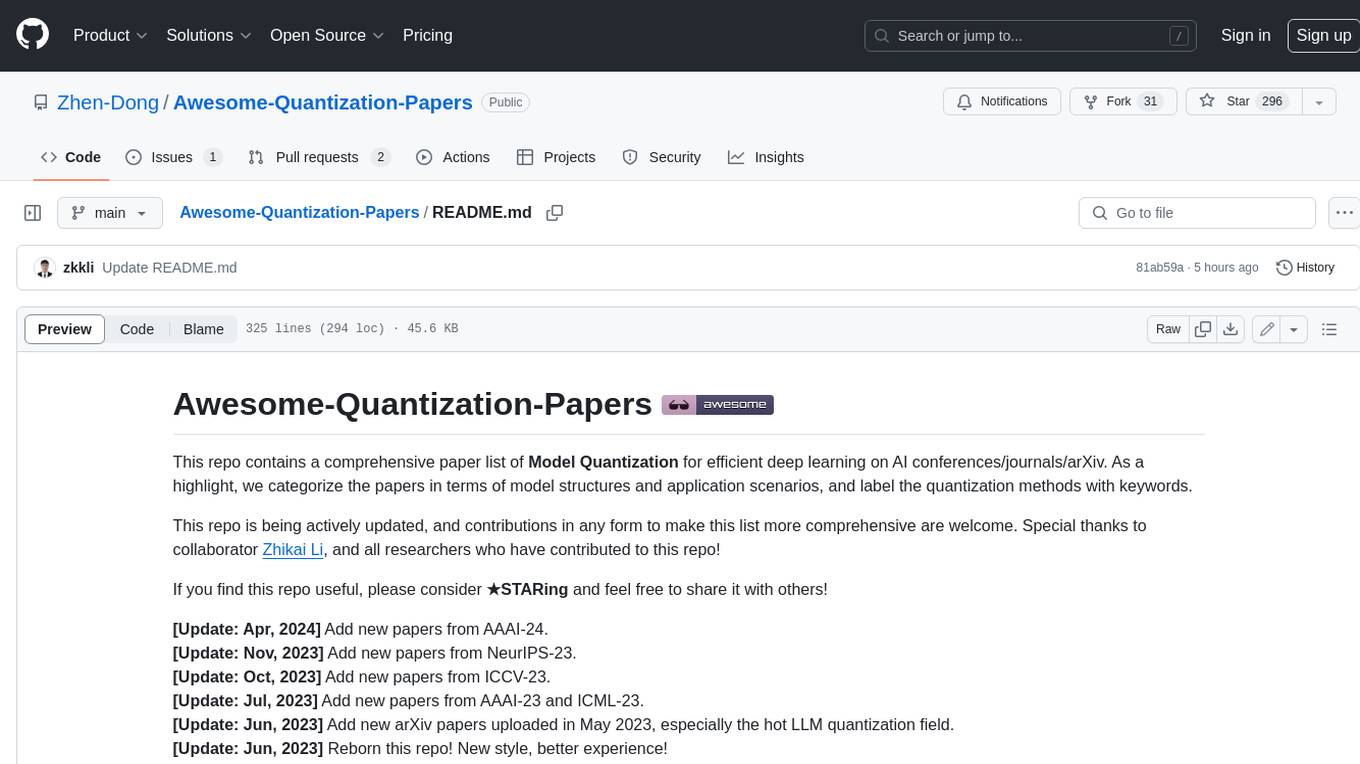
Awesome-Quantization-Papers
This repo contains a comprehensive paper list of **Model Quantization** for efficient deep learning on AI conferences/journals/arXiv. As a highlight, we categorize the papers in terms of model structures and application scenarios, and label the quantization methods with keywords.
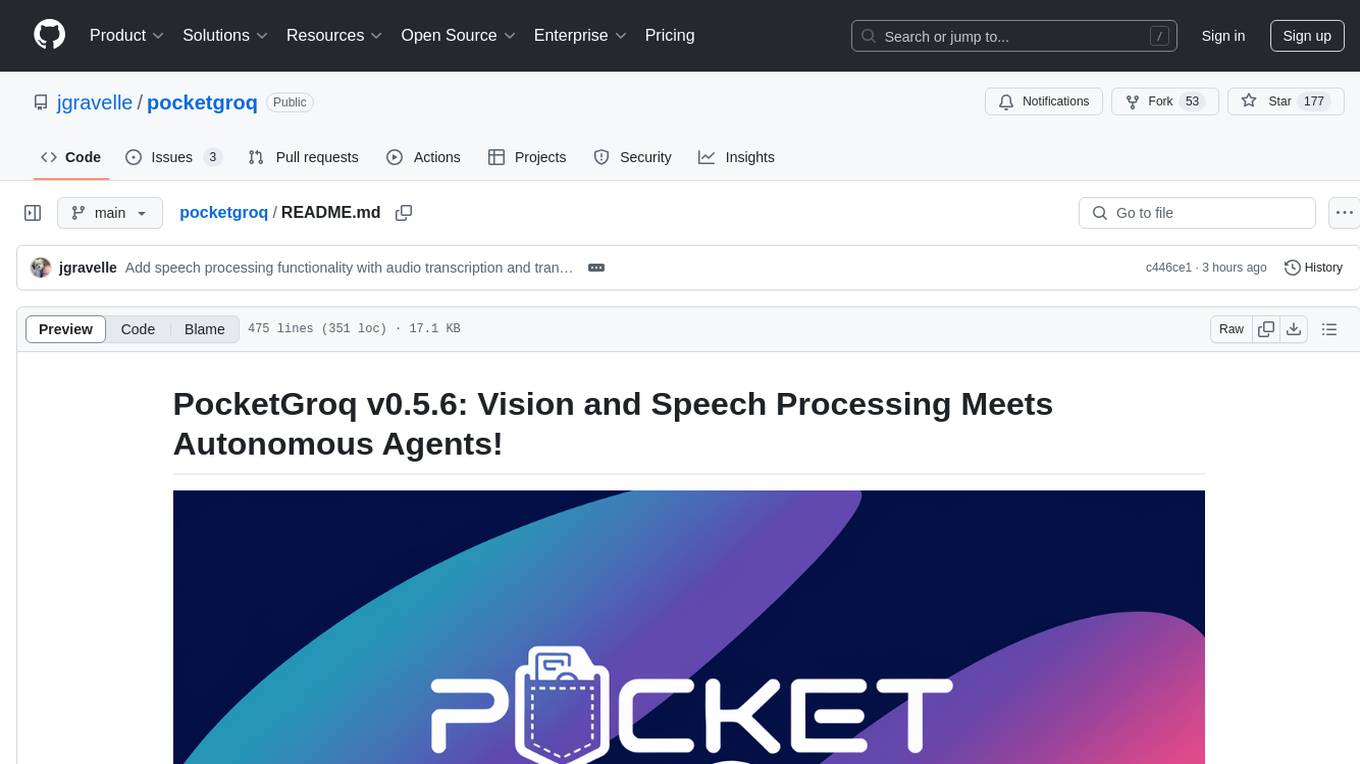
pocketgroq
PocketGroq is a tool that provides advanced functionalities for text generation, web scraping, web search, and AI response evaluation. It includes features like an Autonomous Agent for answering questions, web crawling and scraping capabilities, enhanced web search functionality, and flexible integration with Ollama server. Users can customize the agent's behavior, evaluate responses using AI, and utilize various methods for text generation, conversation management, and Chain of Thought reasoning. The tool offers comprehensive methods for different tasks, such as initializing RAG, error handling, and tool management. PocketGroq is designed to enhance development processes and enable the creation of AI-powered applications with ease.
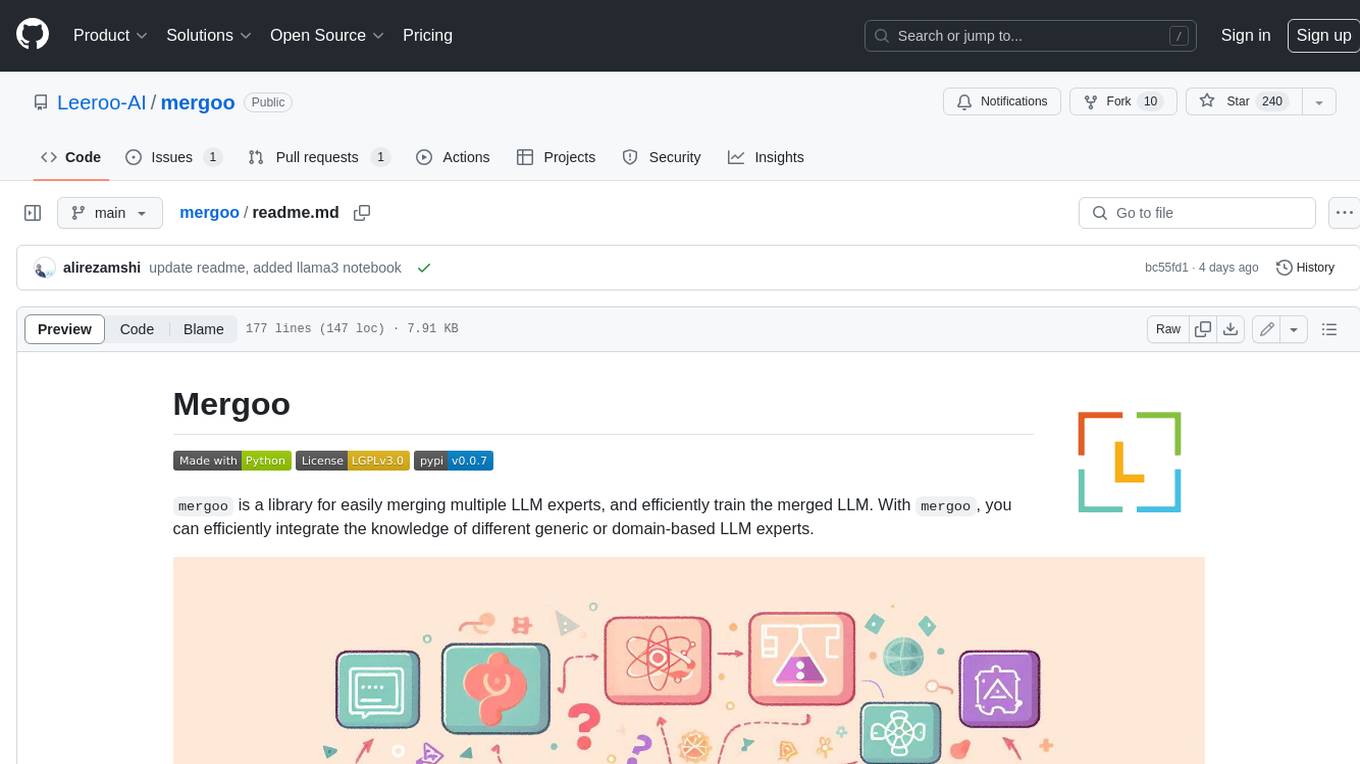
mergoo
Mergoo is a library for easily merging multiple LLM experts and efficiently training the merged LLM. With Mergoo, you can efficiently integrate the knowledge of different generic or domain-based LLM experts. Mergoo supports several merging methods, including Mixture-of-Experts, Mixture-of-Adapters, and Layer-wise merging. It also supports various base models, including LLaMa, Mistral, and BERT, and trainers, including Hugging Face Trainer, SFTrainer, and PEFT. Mergoo provides flexible merging for each layer and supports training choices such as only routing MoE layers or fully fine-tuning the merged LLM.
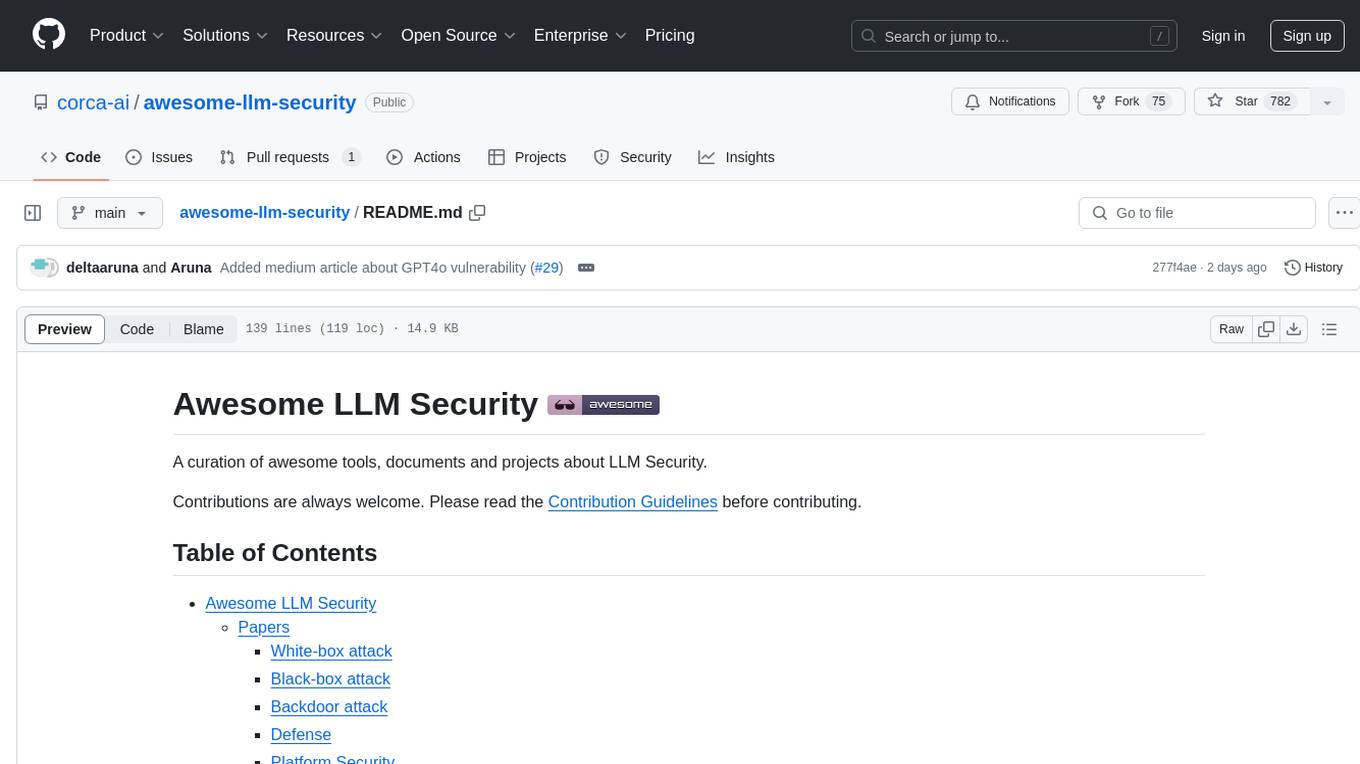
awesome-llm-security
Awesome LLM Security is a curated collection of tools, documents, and projects related to Large Language Model (LLM) security. It covers various aspects of LLM security including white-box, black-box, and backdoor attacks, defense mechanisms, platform security, and surveys. The repository provides resources for researchers and practitioners interested in understanding and safeguarding LLMs against adversarial attacks. It also includes a list of tools specifically designed for testing and enhancing LLM security.
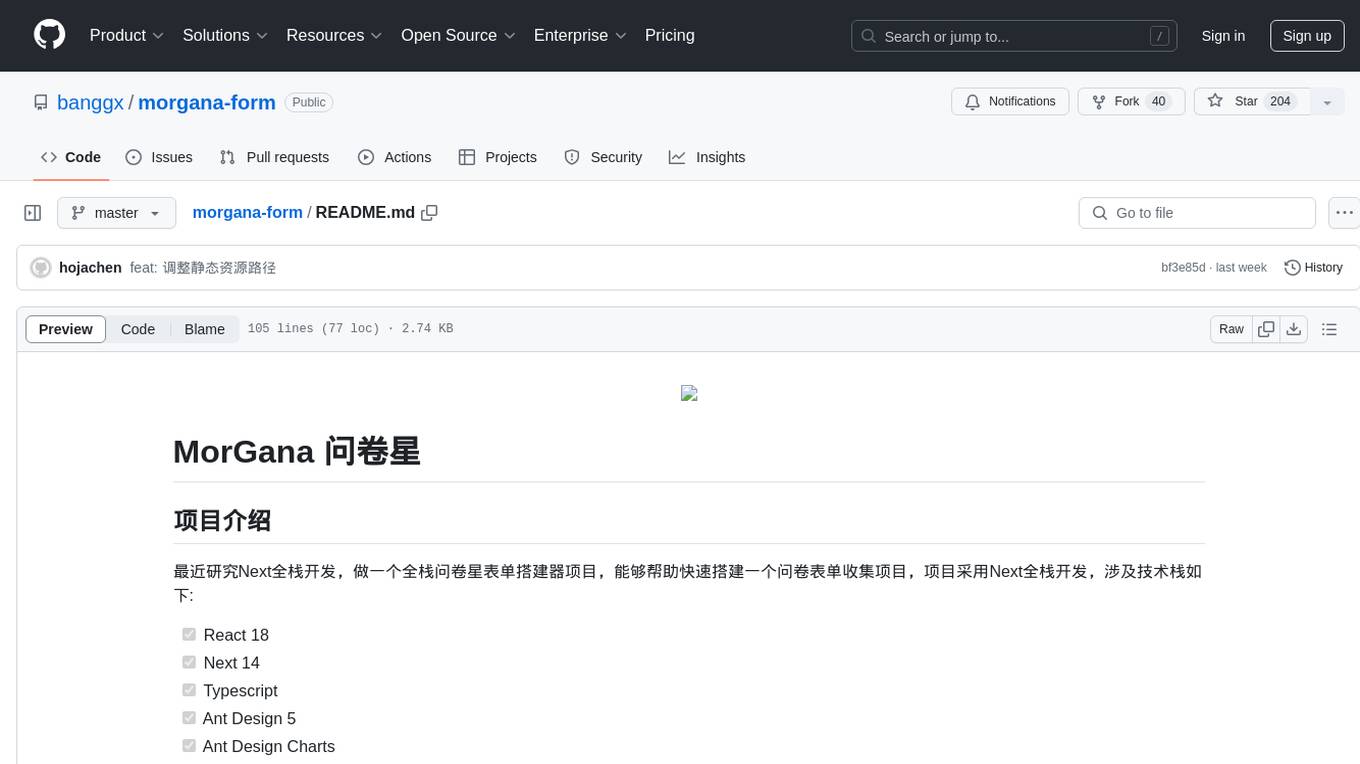
morgana-form
MorGana Form is a full-stack form builder project developed using Next.js, React, TypeScript, Ant Design, PostgreSQL, and other technologies. It allows users to quickly create and collect data through survey forms. The project structure includes components, hooks, utilities, pages, constants, Redux store, themes, types, server-side code, and component packages. Environment variables are required for database settings, NextAuth login configuration, and file upload services. Additionally, the project integrates an AI model for form generation using the Ali Qianwen model API.
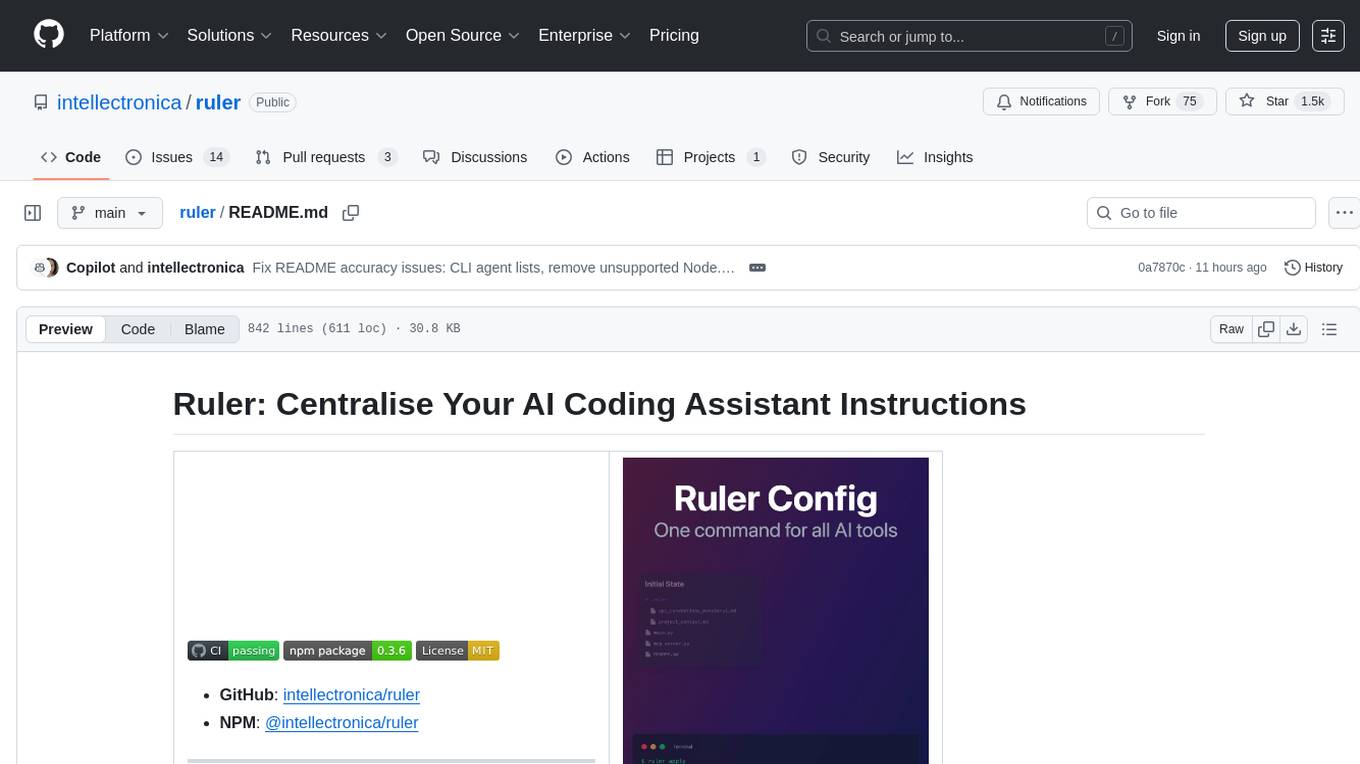
ruler
Ruler is a tool designed to centralize AI coding assistant instructions, providing a single source of truth for managing instructions across multiple AI coding tools. It helps in avoiding inconsistent guidance, duplicated effort, context drift, onboarding friction, and complex project structures by automatically distributing instructions to the right configuration files. With support for nested rule loading, Ruler can handle complex project structures with context-specific instructions for different components. It offers features like centralised rule management, nested rule loading, automatic distribution, targeted agent configuration, MCP server propagation, .gitignore automation, and a simple CLI for easy configuration management.

rlama
RLAMA is a powerful AI-driven question-answering tool that seamlessly integrates with local Ollama models. It enables users to create, manage, and interact with Retrieval-Augmented Generation (RAG) systems tailored to their documentation needs. RLAMA follows a clean architecture pattern with clear separation of concerns, focusing on lightweight and portable RAG capabilities with minimal dependencies. The tool processes documents, generates embeddings, stores RAG systems locally, and provides contextually-informed responses to user queries. Supported document formats include text, code, and various document types, with troubleshooting steps available for common issues like Ollama accessibility, text extraction problems, and relevance of answers.
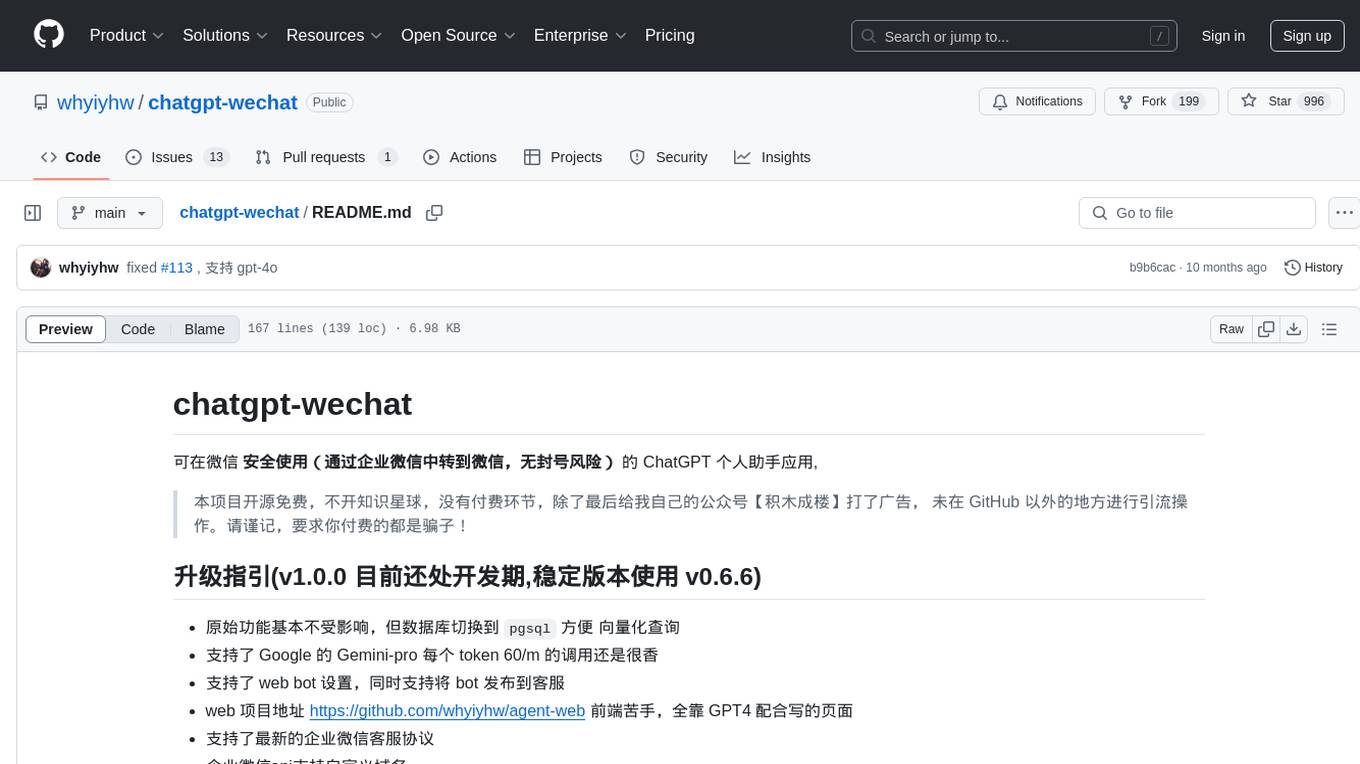
chatgpt-wechat
ChatGPT-WeChat is a personal assistant application that can be safely used on WeChat through enterprise WeChat without the risk of being banned. The project is open source and free, with no paid sections or external traffic operations except for advertising on the author's public account '积木成楼'. It supports various features such as secure usage on WeChat, multi-channel customer service message integration, proxy support, session management, rapid message response, voice and image messaging, drawing capabilities, private data storage, plugin support, and more. Users can also develop their own capabilities following the rules provided. The project is currently in development with stable versions available for use.
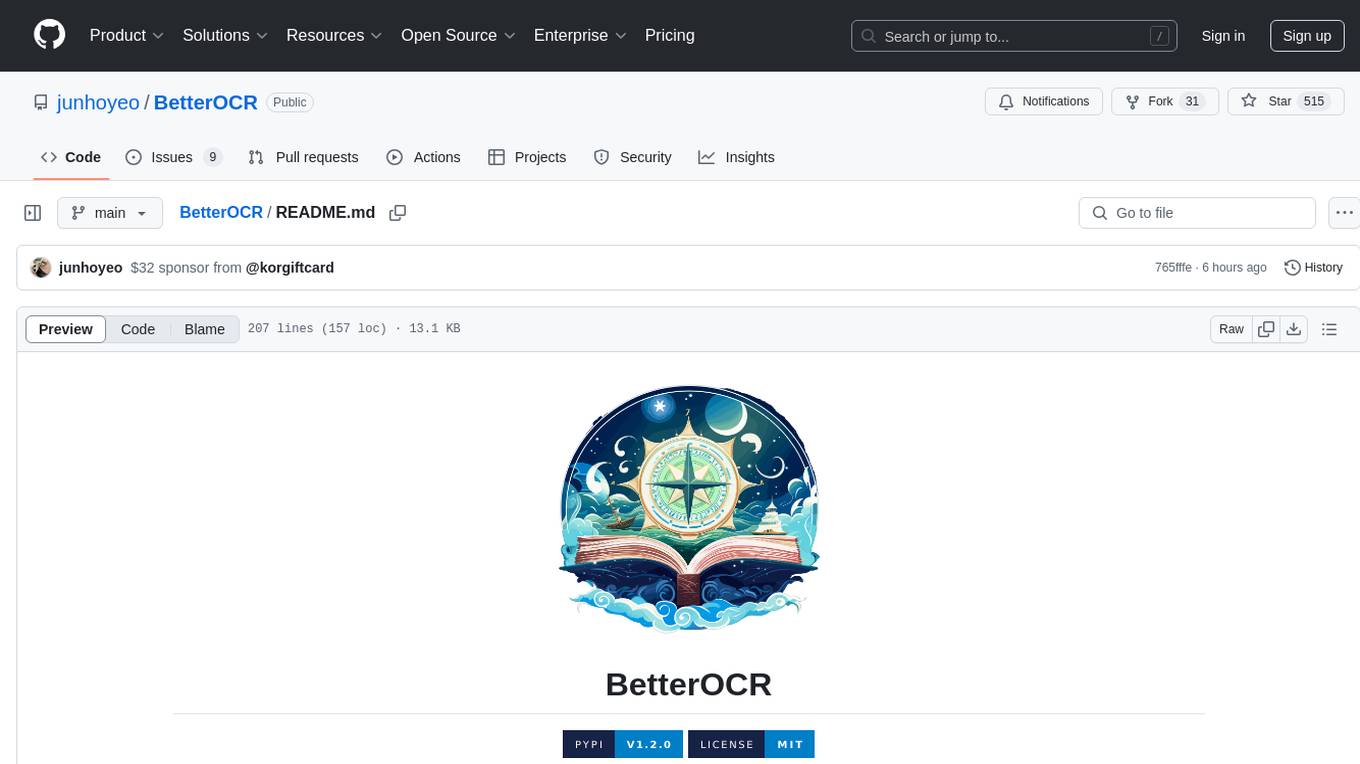
BetterOCR
BetterOCR is a tool that enhances text detection by combining multiple OCR engines with LLM (Language Model). It aims to improve OCR results, especially for languages with limited training data or noisy outputs. The tool combines results from EasyOCR, Tesseract, and Pororo engines, along with LLM support from OpenAI. Users can provide custom context for better accuracy, view performance examples by language, and upcoming features include box detection, improved interface, and async support. The package is under rapid development and contributions are welcomed.
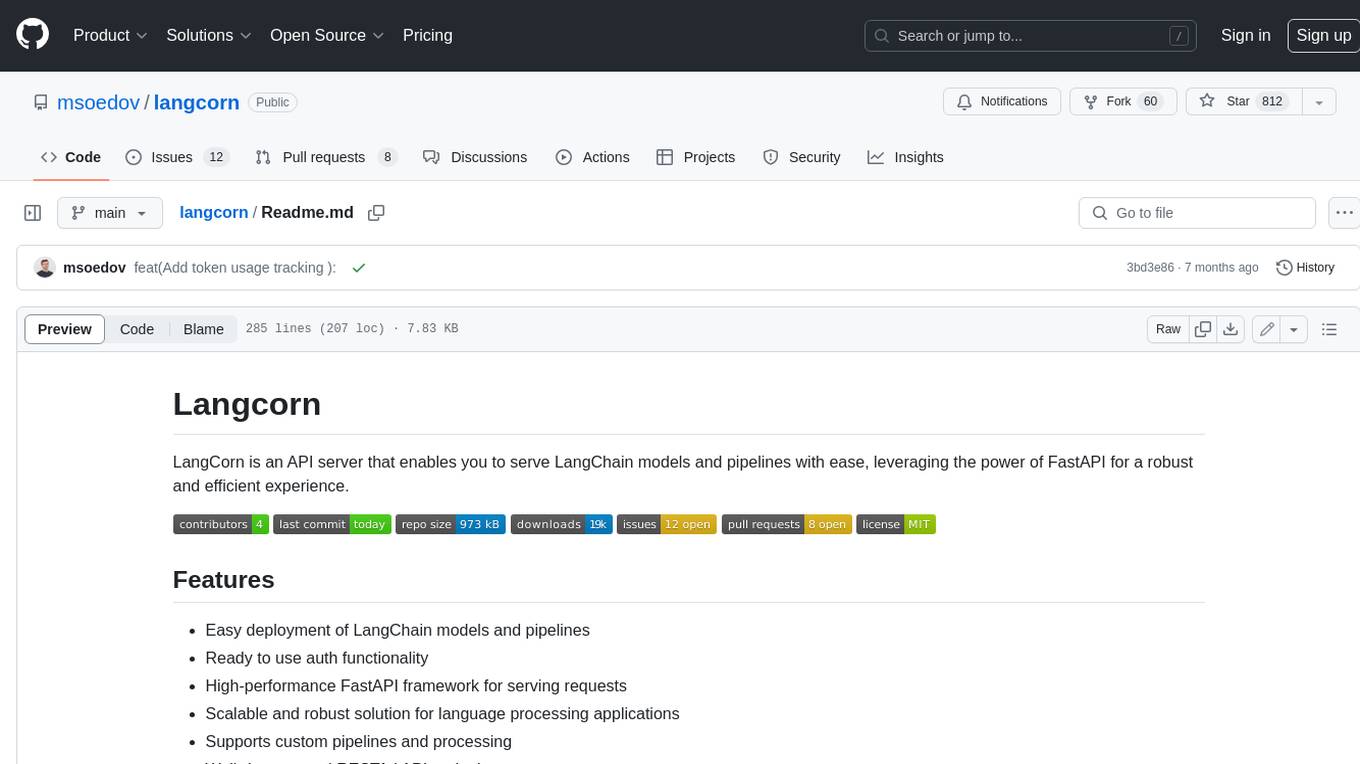
langcorn
LangCorn is an API server that enables you to serve LangChain models and pipelines with ease, leveraging the power of FastAPI for a robust and efficient experience. It offers features such as easy deployment of LangChain models and pipelines, ready-to-use authentication functionality, high-performance FastAPI framework for serving requests, scalability and robustness for language processing applications, support for custom pipelines and processing, well-documented RESTful API endpoints, and asynchronous processing for faster response times.
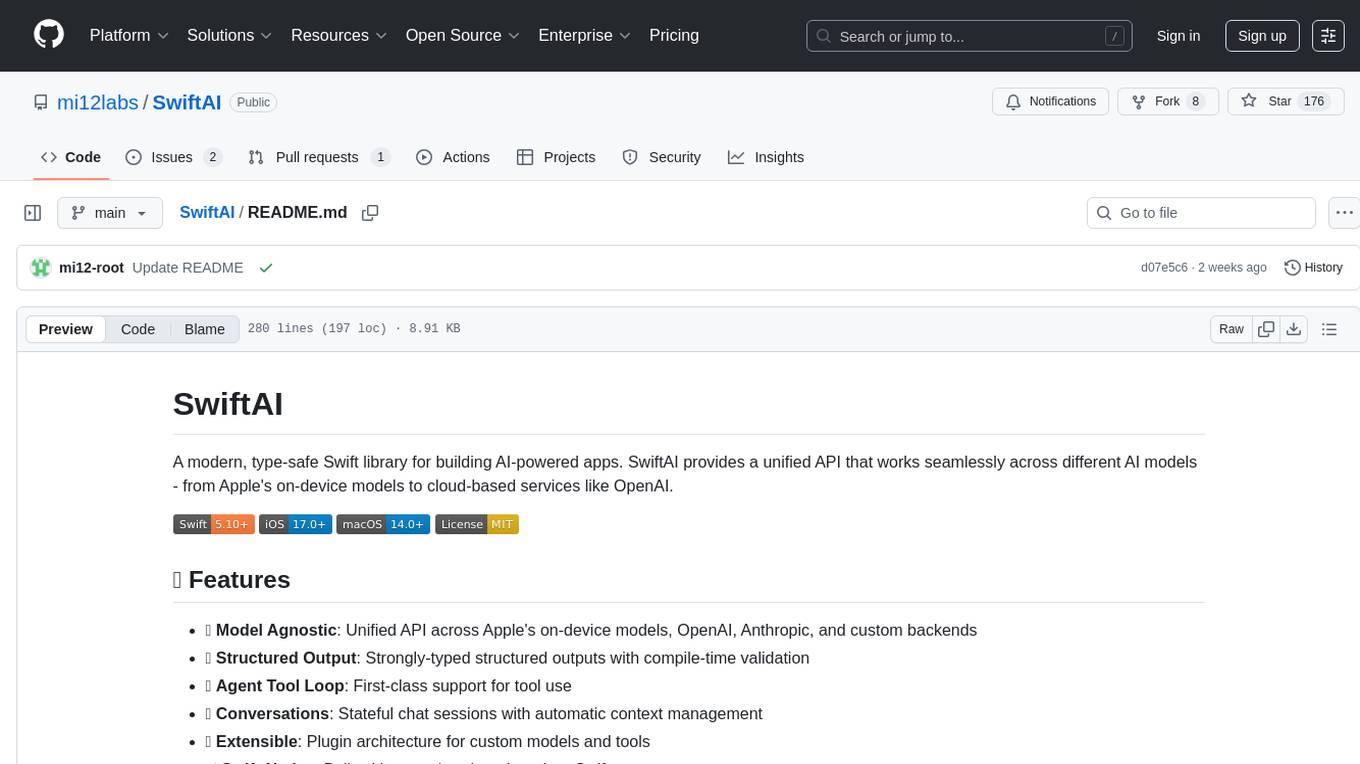
SwiftAI
SwiftAI is a modern, type-safe Swift library for building AI-powered apps. It provides a unified API that works seamlessly across different AI models, including Apple's on-device models and cloud-based services like OpenAI. With features like model agnosticism, structured output, agent tool loop, conversations, extensibility, and Swift-native design, SwiftAI offers a powerful toolset for developers to integrate AI capabilities into their applications. The library supports easy installation via Swift Package Manager and offers detailed guidance on getting started, structured responses, tool use, model switching, conversations, and advanced constraints. SwiftAI aims to simplify AI integration by providing a type-safe and versatile solution for various AI tasks.
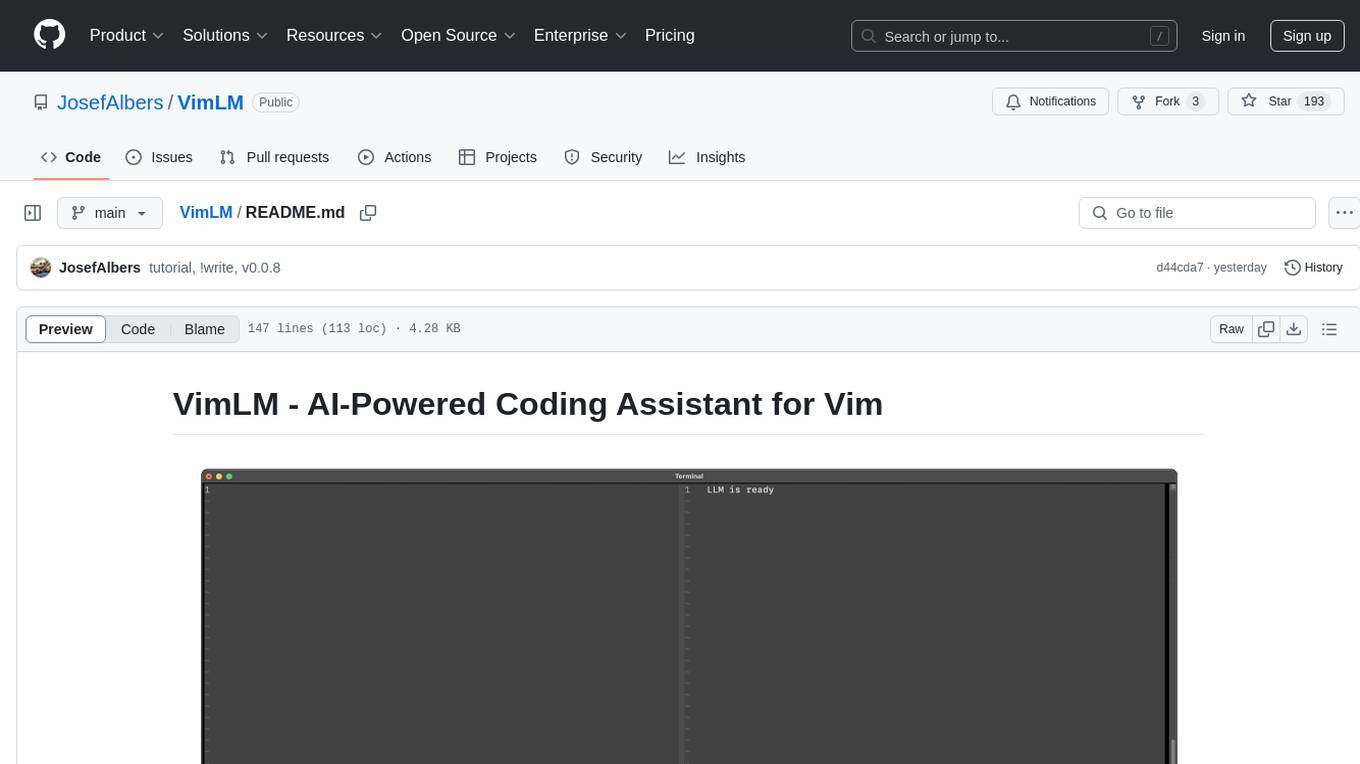
VimLM
VimLM is an AI-powered coding assistant for Vim that integrates AI for code generation, refactoring, and documentation directly into your Vim workflow. It offers native Vim integration with split-window responses and intuitive keybindings, offline first execution with MLX-compatible models, contextual awareness with seamless integration with codebase and external resources, conversational workflow for iterating on responses, project scaffolding for generating and deploying code blocks, and extensibility for creating custom LLM workflows with command chains.
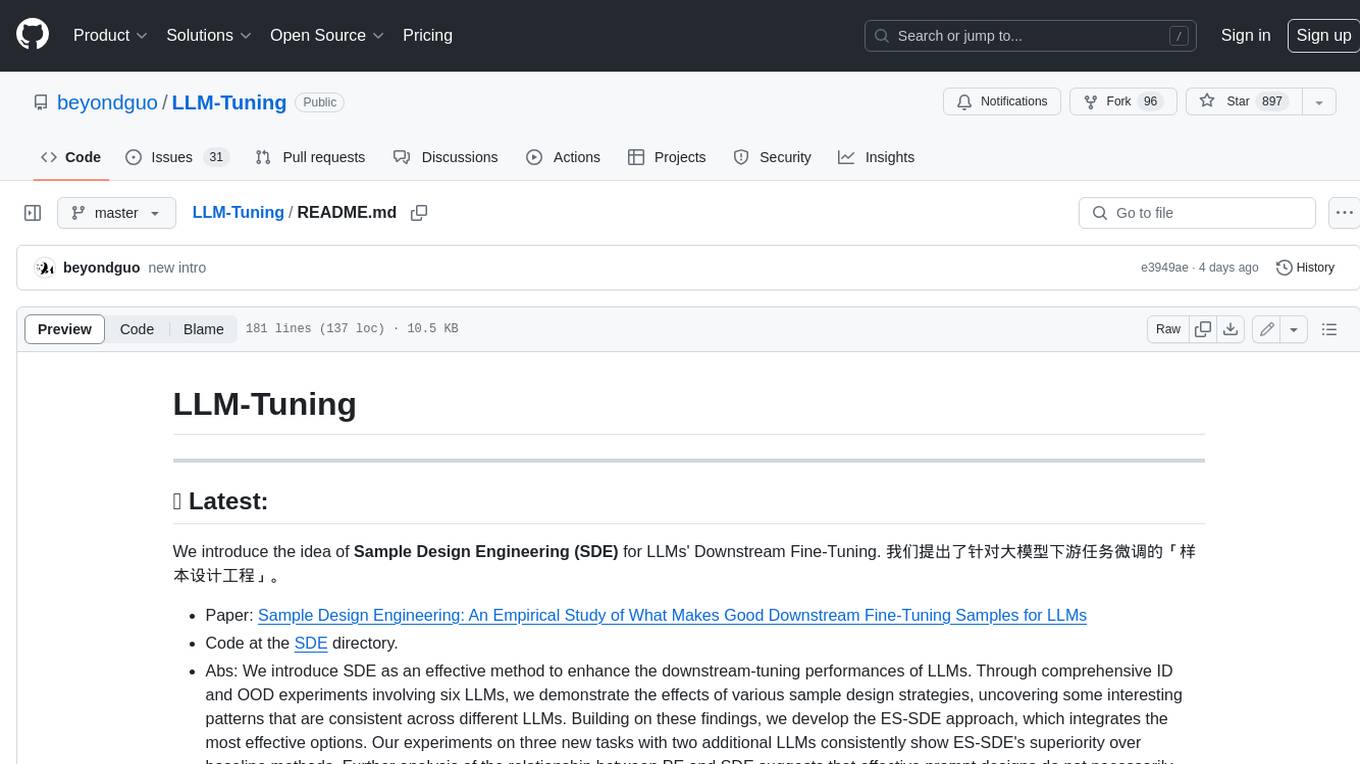
LLM-Tuning
LLM-Tuning is a collection of tools and resources for fine-tuning large language models (LLMs). It includes a library of pre-trained LoRA models, a set of tutorials and examples, and a community forum for discussion and support. LLM-Tuning makes it easy to fine-tune LLMs for a variety of tasks, including text classification, question answering, and dialogue generation. With LLM-Tuning, you can quickly and easily improve the performance of your LLMs on downstream tasks.
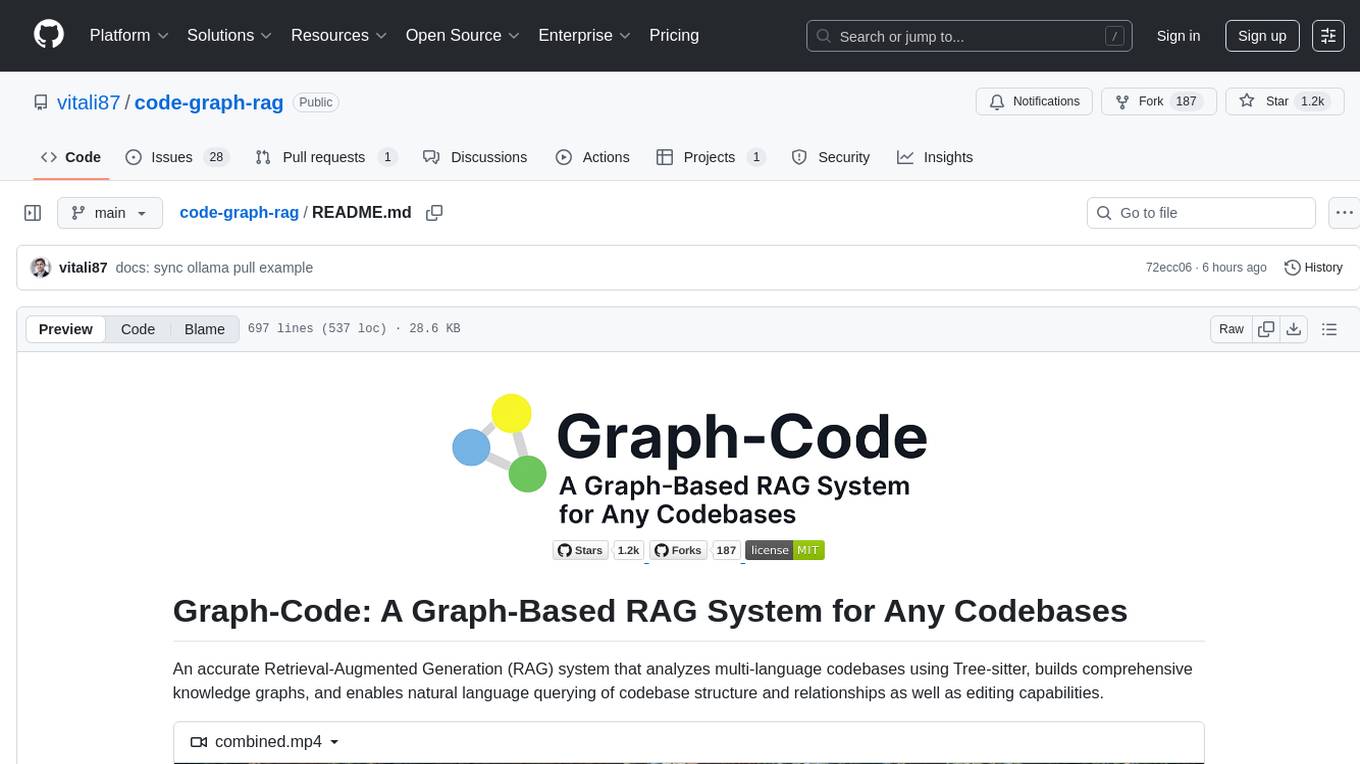
code-graph-rag
Graph-Code is an accurate Retrieval-Augmented Generation (RAG) system that analyzes multi-language codebases using Tree-sitter. It builds comprehensive knowledge graphs, enabling natural language querying of codebase structure and relationships, along with editing capabilities. The system supports various languages, uses Tree-sitter for parsing, Memgraph for storage, and AI models for natural language to Cypher translation. It offers features like code snippet retrieval, advanced file editing, shell command execution, interactive code optimization, reference-guided optimization, dependency analysis, and more. The architecture consists of a multi-language parser and an interactive CLI for querying the knowledge graph.
For similar tasks

KG-LLM-Papers
KG-LLM-Papers is a repository that collects papers integrating knowledge graphs (KGs) and large language models (LLMs). It serves as a comprehensive resource for research on the role of KGs in the era of LLMs, covering surveys, methods, and resources related to this integration.
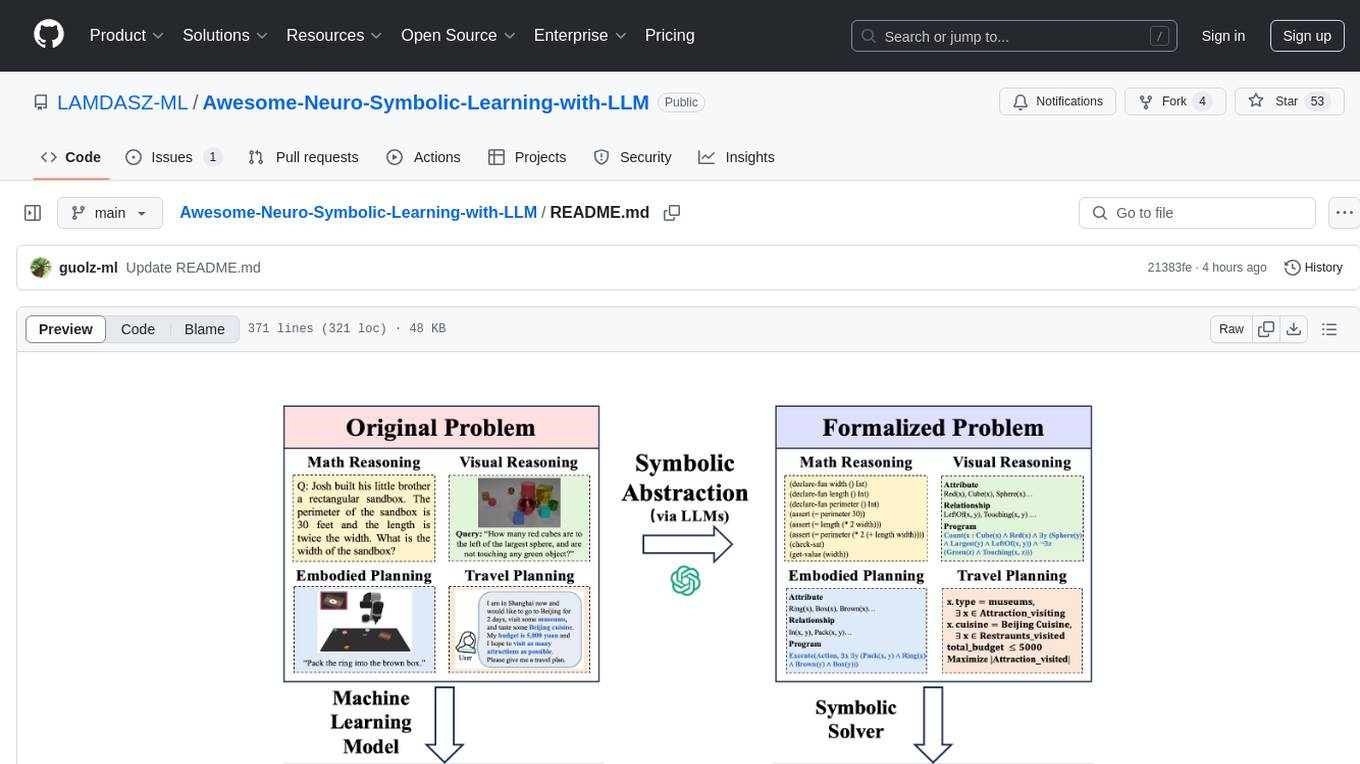
Awesome-Neuro-Symbolic-Learning-with-LLM
The Awesome-Neuro-Symbolic-Learning-with-LLM repository is a curated collection of papers and resources focusing on improving reasoning and planning capabilities of Large Language Models (LLMs) and Multi-Modal Large Language Models (MLLMs) through neuro-symbolic learning. It covers a wide range of topics such as neuro-symbolic visual reasoning, program synthesis, logical reasoning, mathematical reasoning, code generation, visual reasoning, geometric reasoning, classical planning, game AI planning, robotic planning, AI agent planning, and more. The repository provides a comprehensive overview of tutorials, workshops, talks, surveys, papers, datasets, and benchmarks related to neuro-symbolic learning with LLMs and MLLMs.
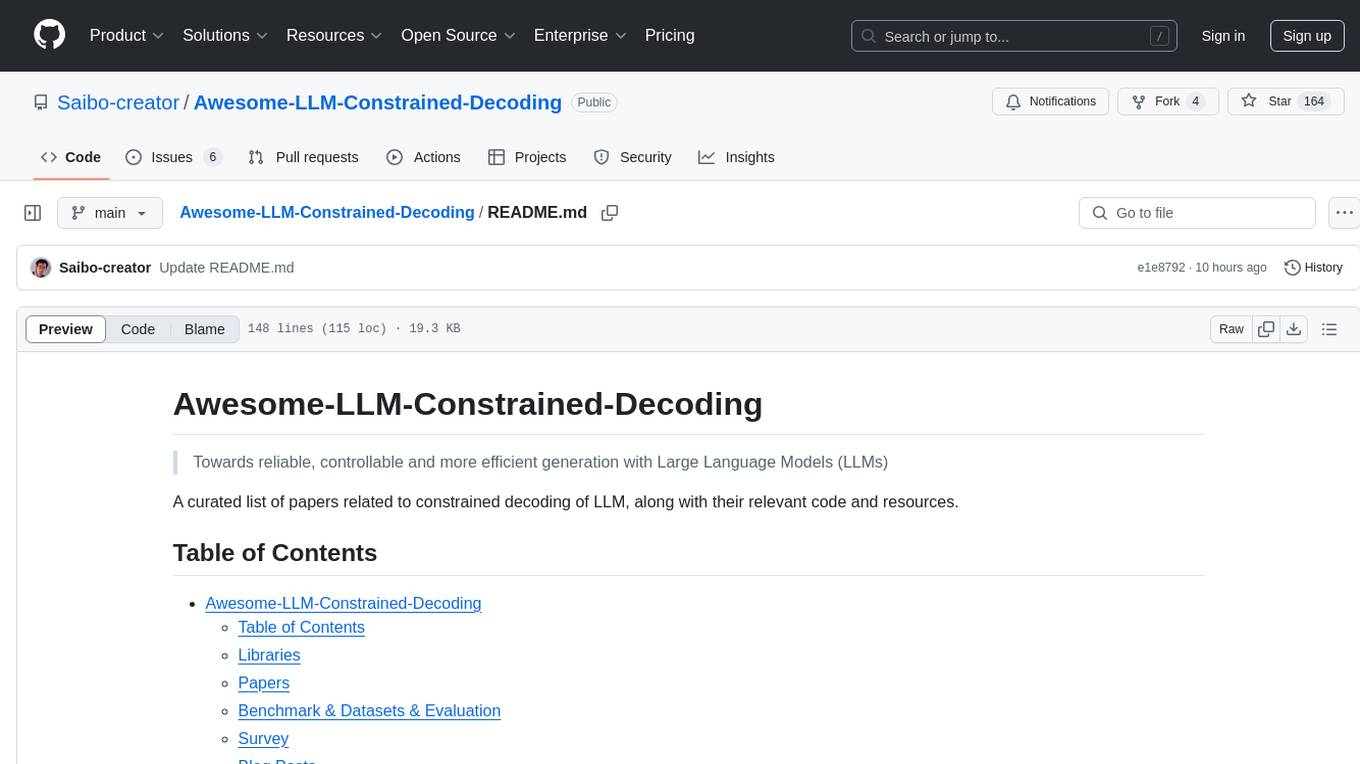
Awesome-LLM-Constrained-Decoding
Awesome-LLM-Constrained-Decoding is a curated list of papers, code, and resources related to constrained decoding of Large Language Models (LLMs). The repository aims to facilitate reliable, controllable, and efficient generation with LLMs by providing a comprehensive collection of materials in this domain.
For similar jobs

weave
Weave is a toolkit for developing Generative AI applications, built by Weights & Biases. With Weave, you can log and debug language model inputs, outputs, and traces; build rigorous, apples-to-apples evaluations for language model use cases; and organize all the information generated across the LLM workflow, from experimentation to evaluations to production. Weave aims to bring rigor, best-practices, and composability to the inherently experimental process of developing Generative AI software, without introducing cognitive overhead.

LLMStack
LLMStack is a no-code platform for building generative AI agents, workflows, and chatbots. It allows users to connect their own data, internal tools, and GPT-powered models without any coding experience. LLMStack can be deployed to the cloud or on-premise and can be accessed via HTTP API or triggered from Slack or Discord.

VisionCraft
The VisionCraft API is a free API for using over 100 different AI models. From images to sound.

kaito
Kaito is an operator that automates the AI/ML inference model deployment in a Kubernetes cluster. It manages large model files using container images, avoids tuning deployment parameters to fit GPU hardware by providing preset configurations, auto-provisions GPU nodes based on model requirements, and hosts large model images in the public Microsoft Container Registry (MCR) if the license allows. Using Kaito, the workflow of onboarding large AI inference models in Kubernetes is largely simplified.

PyRIT
PyRIT is an open access automation framework designed to empower security professionals and ML engineers to red team foundation models and their applications. It automates AI Red Teaming tasks to allow operators to focus on more complicated and time-consuming tasks and can also identify security harms such as misuse (e.g., malware generation, jailbreaking), and privacy harms (e.g., identity theft). The goal is to allow researchers to have a baseline of how well their model and entire inference pipeline is doing against different harm categories and to be able to compare that baseline to future iterations of their model. This allows them to have empirical data on how well their model is doing today, and detect any degradation of performance based on future improvements.

tabby
Tabby is a self-hosted AI coding assistant, offering an open-source and on-premises alternative to GitHub Copilot. It boasts several key features: * Self-contained, with no need for a DBMS or cloud service. * OpenAPI interface, easy to integrate with existing infrastructure (e.g Cloud IDE). * Supports consumer-grade GPUs.

spear
SPEAR (Simulator for Photorealistic Embodied AI Research) is a powerful tool for training embodied agents. It features 300 unique virtual indoor environments with 2,566 unique rooms and 17,234 unique objects that can be manipulated individually. Each environment is designed by a professional artist and features detailed geometry, photorealistic materials, and a unique floor plan and object layout. SPEAR is implemented as Unreal Engine assets and provides an OpenAI Gym interface for interacting with the environments via Python.

Magick
Magick is a groundbreaking visual AIDE (Artificial Intelligence Development Environment) for no-code data pipelines and multimodal agents. Magick can connect to other services and comes with nodes and templates well-suited for intelligent agents, chatbots, complex reasoning systems and realistic characters.


